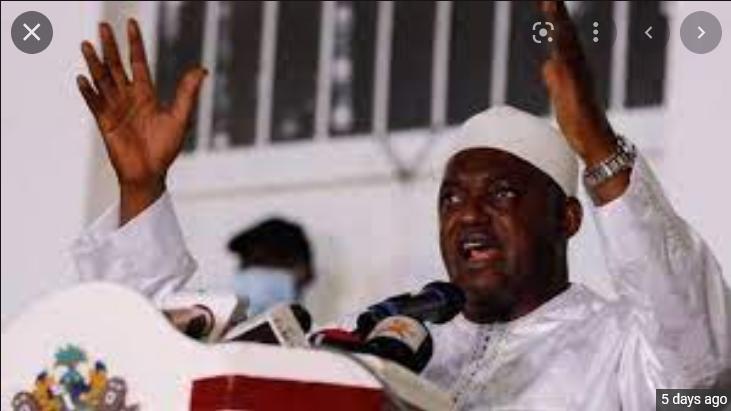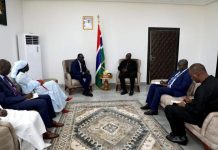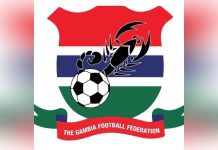Africa-Press – Gambia. Adama Barrow sweeping the polls on Sunday, 5 December for a second term in office as the president of Gambia signaled a new dawn for the African nation that was marred with misrule and corruption.
The election was seen as a test of democracy in the country, five years after the country’s former dictator Yahya Jammeh was forced out of power. Jammeh who ruled for 22 years after seizing power in a bloodless coup in 1994, was forcefully removed by military intervention from other west African states.
After Jammeh lead a successful coup, he had stated that he didn’t have plans to stay in power for long, but was only after setting a just system. However, things took a different turn when he tasted power and vowed to rule Gambia for a billion years while stating that ”no military, election or foreign power, can take me out of office unless Allah says so.”
The coalition that saw Jammeh out of power was formed in 2016, and it followed a memorandum of understanding (MOU), which stated that any individual representing the coalition was used as an instrument to push Jammeh out of power must serve for only three years.
Following which the cabinet will be dissolved and a fresh election would be conducted. The coalition was aimed at ending self perpetuating rule and impunity in the country.
After a series of events, Barrow who at the time was the treasurer of the biggest opposition party, The United Democratic Party (UDP), became the flag bearer of the coalition party.
Following the outcome of an election where Barrow was declared winner, Jammeh shocked the world with his open acceptance of the outcome of the polls. However, it didn’t take long for the former dictator to make a u-turn.
Following the rejection of the outcome of the election by Jammeh, the president-elect at the time, Barrow had to go into hiding and was in fact sworn in, in a neighboring country, Senegal.
After the swearing-in, members of the coalition party were given key positions in the Barrow-led government. However, problems began to occur when some of the coalition ministers were accused of corruption and were fired by Barrow.
Angered by the action of Barrow, questions about the MOU began to arise, particularly about the number of years to be spent in power by Barrow. Many coalition members who were fired or resigned from the Barrow-led government argued that the president should respect the 3-year agreement stipulated on the MOU.
Meanwhile, those who were still in the system argued that the MOU wasn’t signed and that the three years clause was against the constitution of the country, which stipulates that an elected president should govern for five years.
And just like that, five years elapsed with Barrow contesting again for a second tenure as president. The 56-year-old faced challenges in his re-election bid. First was a group agitating for the president to honour the agreement of the MOU as agreed by the coalition, however, a counter group emerged in support of Barrow.
The group named ‘The Barrow Youth Movement’ which later became ‘The National Peoples Party’ (NPP), became president Barrow’s official political party.
Ahead of the just concluded election, NPP formed a coalition with APRC, the official political party of the country’s former dictator, Jammeh. Barrow formed a coalition with the very party that was forced out of power because of dictatorship and human rights violations.
Barrow formed an alliance with the party of the same man accused of committing monstrous atrocities during his 22 years in power and also weakened actions set to look into crimes committed under Jammeh’s tenure.
In 2017, Barrow had established the Truth, Reconciliation and Reparations Commission (TRRC), to probe the alleged abuses under Jammeh’s rule and seek justice for the victims.
In the years that followed, the TRRC heard harrowing testimonies from hundreds of witnesses, including former officials of the Jammeh administration as well as victims and their relatives. The commission said up to 250 people had died in state-sanctioned abuse, while the use of death squads, rape, and torture as punishment was rampant.
In late November, the TRRC’s report was delivered to Barrow, however, neither the 14,000-page document nor the names of the alleged perpetrators, have been made public. And now Barrow who was only supposed to lead a 3-year transitional government has formed a coalition with Jammeh’s party.
The actions of Barrow has only brought the popular saying ‘power tends to corrupt, and absolute power corrupts absolutely’ to life. Following the coalition of NPP and APRC, people began to ask questions, could it be that Jammeh and Barrow have a master plan, or could it be that Jammeh still have a stronghold on Gambia’s politics.
Jammeh has however denied any link with Barrow, stating that decisions had been taken without his knowledge, and his supporters formed a rival party. To prove himself, Jammeh had gone ahead to fire all executive members of the APRC.
Now, this can only mean one thing, like every African President, Barrow has a long-term political ambition. The President had earlier announced that his government plans to draft a new constitution that would introduce presidential term limits, but fell short of saying whether he personally would seek additional mandates.
For More News And Analysis About Gambia Follow Africa-Press






